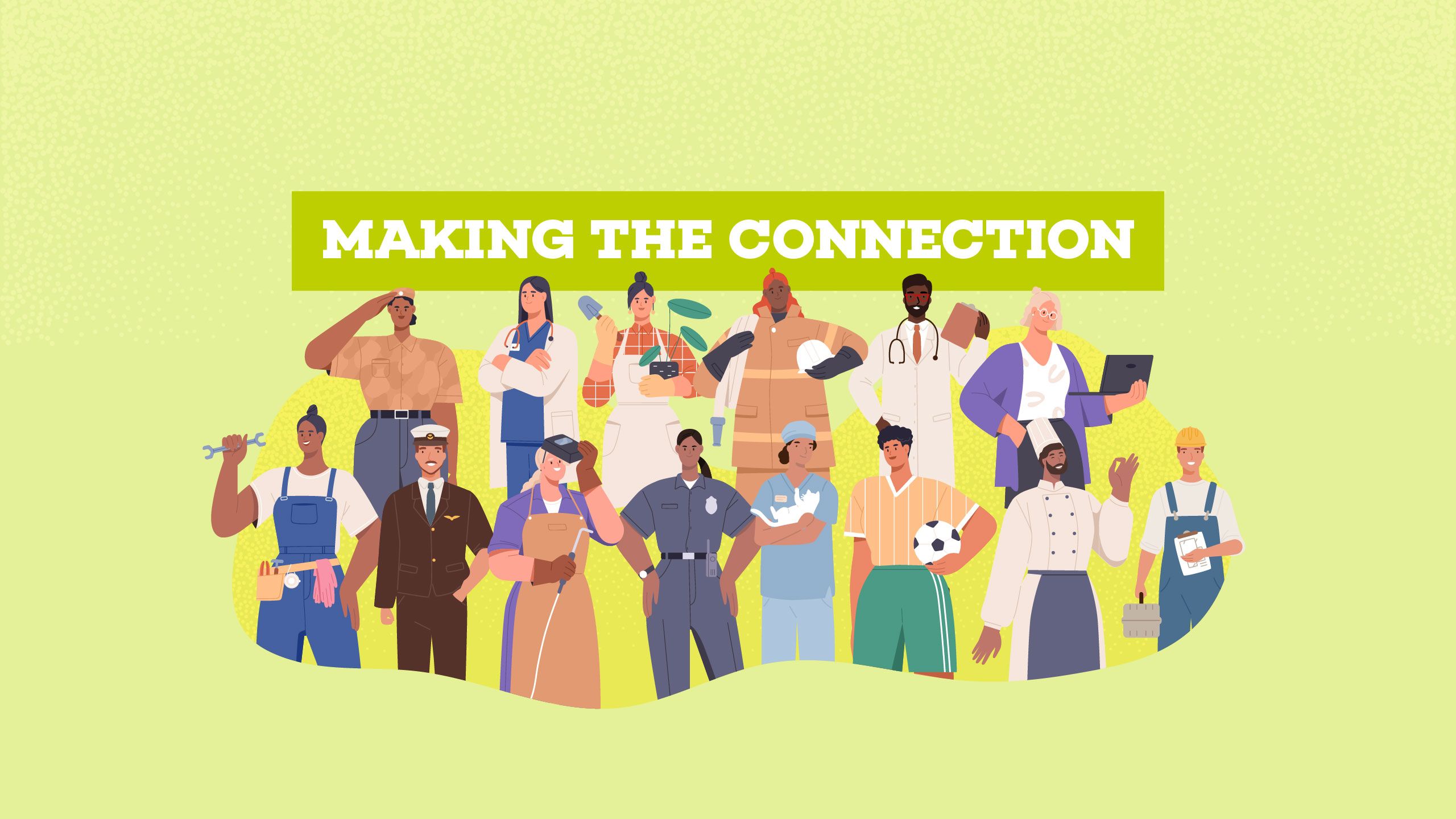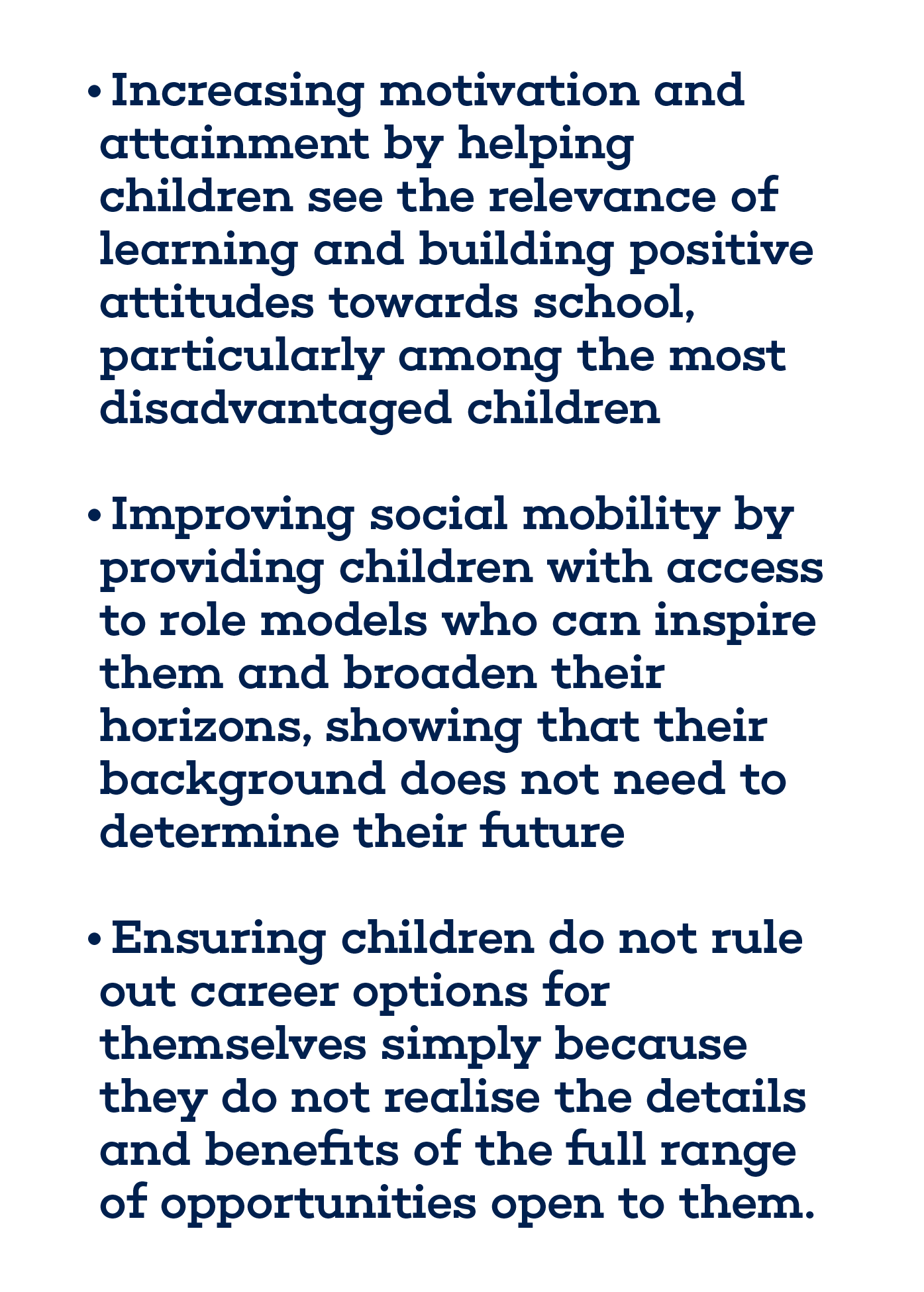
Leadership Focus journalist Nic Paton looks at Primary Futures, the NAHT-led initiative to connect primary schools more closely with the world of work.
“We’ve had so many volunteers come into school, including one who works on a nuclear submarine – how cool is that?


“Another was an air traffic control programmer whose opening line was ‘if I get it wrong, people will die’, and an RAF veteran from the Iraq war who brought in their medals and talked about how planes fly – and even got the children to make effective paper aeroplanes.
“We’ve had people who design wind turbines and bridges. All of them engaged brilliantly with the children.”

“We’ve had so many volunteers come into school, including one who works on a nuclear submarine – how cool is that?


“Another was an air traffic control programmer whose opening line was ‘if I get it wrong, people will die’, and an RAF veteran from the Iraq war who brought in their medals and talked about how planes fly – and even got the children to make effective paper aeroplanes.
“We’ve had people who design wind turbines and bridges. All of them engaged brilliantly with the children.”


JOHN SNELL
HEAD TEACHER AT WELTON PRIMARY SCHOOL IN SOMERSET
John Snell, head teacher of Welton Primary School in Somerset, is inspired and inspiring about Primary Futures, the initiative run in partnership with NAHT and charity Education and Employers to connect primary schools more closely with the world of work.
The partnership, which has been in place since 2014, is part of the Inspiring the Future service by Education and Employers and, very simply, facilitates the setting up of aspirational activities and talks in schools by workplace volunteers.
As John, who as well as being a beneficiary of the initiative acts as an ambassador for Primary Futures, explains: “In our case, they are short, sweet, half-an-hour sessions that the children really love; the children are always enthralled.
“As a school, we’re committed to having a number of career-related events each year, both physical and virtual, all enabled through the Primary Futures portal. The most successful of these, without doubt, is when my pupils meet visitors from the world of work face to face. That has, in turn, led us down the route of engaging parents better. We now get parents wanting to come in and talk about what they do, because they see the importance of empowering our children. We have recently had a parent who talked about their own tree surgery business, a vet and a nurse, for example,” he adds.


As John, who as well as being a beneficiary of the initiative acts as an ambassador for Primary Futures, explains: “In our case, they are short, sweet, half-an-hour sessions that the children really love; the children are always enthralled.
“As a school, we’re committed to having a number of career-related events each year, both physical and virtual, all enabled through the Primary Futures portal. The most successful of these, without doubt, is when my pupils meet visitors from the world of work face to face. That has, in turn, led us down the route of engaging parents better. We now get parents wanting to come in and talk about what they do, because they see the importance of empowering our children. We have recently had a parent who talked about their own tree surgery business, a vet and a nurse, for example,” he adds.

CHARLOTTE THURSTON
DIRECTOR OF PROGRAMMES AT EDUCATION AND EMPLOYERS
“Primary Futures is free to register and use; there is no charge for schools for any aspect of the programme,” emphasises Charlotte Thurston, director of programmes at Education and Employers.
“We match schools to volunteers in their local area via innovative technology, and teachers then choose who they want to invite in. It is very much teacher-led. We have had more than 80,000 volunteers register nationally since the programme began, and many of our volunteers are also available for virtual activities,” she adds.
Once registered, schools can access the volunteer database and use the self-service platform to invite volunteers from different jobs, sectors and career routes to speak with children. These can be virtual or in-person events.
Alongside actual talks, there is a database of pre-recorded video sessions (see example above) that schools can use in the classroom. These cover a broad range of topics; for example, gender stereotypes (see ‘Uplifting futures: tackling gender stereotypes (key stage two)’ and ‘Budding futures: tackling gender stereotypes (key stage one/year three)’), TV and technology, and specific jobs or careers, such as working for the NHS. Primary Futures can also work with school leaders on the best ways to connect the workplace with curriculum topics, such as civil rights or polar exploration, among many others.
There are resources that teachers can download and use to help plan their activities or complement awareness-raising initiatives such as World Book Day or Science Week, Charlotte points out.
Finally, it is possible to access bespoke support to get the most out of the platform and plan sessions, including live or on-demand interactive training for teachers on best practice ideas.
“We all know head teachers have many different competing priorities to deal with every day. And we want to show that this sort of activity is not difficult to put in place; it is all set up, and we are here to help. We can give you lots of ideas on what you could do and show you what other schools have done to get you started,” Charlotte adds.
“It is genuinely minimum effort and zero cost,” agrees John, who argues that the only ‘cost’ to a school is that you or your staff will, of course, need to give a bit of time to set things up for a physical event and then attend the actual event itself.
“There is a bit of time required; there is no doubt about that. However, Primary Futures runs online sessions explaining what it will all involve; there is also a lot of really good online content that you can tap into. It is free and has a high impact – all for a very small amount of effort,” John says.
One further important point to emphasise is that while the talks are notionally about work and often specific careers, Primary Futures is not about giving primary school-age children ‘careers talks’ such as you might get in secondary education, says Charlotte.
“It is simply about broadening horizons; it is about helping their children to see the value of what they’re learning and how that is important beyond the immediate school environment,” Charlotte says.
However, as John points out, engaging with Primary Futures can feed through to embedding important connections into children’s wider learning.
“Young people can’t be what they can’t see. So, this has enabled me to consider the additional ways – with Primary Futures as the beating heart of what we do – I can draw on career-related learning in my school. It has been a vehicle to help me promote career learning, and the impact of that has been enormous. Children who have now moved up to secondary school still remember and talk about these events,” he explains.
“It is not a set, prescriptive model. You can make it work around the time you have and focus it on areas of priority for your school,” agrees Charlotte in conclusion.




Once registered, schools can access the volunteer database and use the self-service platform to invite volunteers from different jobs, sectors and career routes to speak with children. These can be virtual or in-person events.
Alongside actual talks, there is a database of pre-recorded video sessions (see example above) that schools can use in the classroom. These cover a broad range of topics; for example, gender stereotypes (see ‘Uplifting futures: tackling gender stereotypes (key stage two)’ and ‘Budding futures: tackling gender stereotypes (key stage one/year three)’), TV and technology, and specific jobs or careers, such as working for the NHS. Primary Futures can also work with school leaders on the best ways to connect the workplace with curriculum topics, such as civil rights or polar exploration, among many others.
There are resources that teachers can download and use to help plan their activities or complement awareness-raising initiatives such as World Book Day or Science Week, Charlotte points out.
Finally, it is possible to access bespoke support to get the most out of the platform and plan sessions, including live or on-demand interactive training for teachers on best practice ideas.
“We all know head teachers have many different competing priorities to deal with every day. And we want to show that this sort of activity is not difficult to put in place; it is all set up, and we are here to help. We can give you lots of ideas on what you could do and show you what other schools have done to get you started,” Charlotte adds.

“It is genuinely minimum effort and zero cost,” agrees John, who argues that the only ‘cost’ to a school is that you or your staff will, of course, need to give a bit of time to set things up for a physical event and then attend the actual event itself.
“There is a bit of time required; there is no doubt about that. However, Primary Futures runs online sessions explaining what it will all involve; there is also a lot of really good online content that you can tap into. It is free and has a high impact – all for a very small amount of effort,” John says.
One further important point to emphasise is that while the talks are notionally about work and often specific careers, Primary Futures is not about giving primary school-age children ‘careers talks’ such as you might get in secondary education, says Charlotte.
“It is simply about broadening horizons; it is about helping their children to see the value of what they’re learning and how that is important beyond the immediate school environment,” Charlotte says.
However, as John points out, engaging with Primary Futures can feed through to embedding important connections into children’s wider learning.
“Young people can’t be what they can’t see. So, this has enabled me to consider the additional ways – with Primary Futures as the beating heart of what we do – I can draw on career-related learning in my school. It has been a vehicle to help me promote career learning, and the impact of that has been enormous. Children who have now moved up to secondary school still remember and talk about these events,” he explains.
“It is not a set, prescriptive model. You can make it work around the time you have and focus it on areas of priority for your school,” agrees Charlotte in conclusion.

Simply sign up at www.primaryfutures.org, and you’ll then receive an invite to book a call with a team member.
Teachers can also sign up for regular webinars as a quick, easy way to learn more about using Primary Futures, with a live demonstration and the chance to ask questions.
Beyond this, as highlighted above, schools can use a self-service platform to invite volunteers to speak with children virtually or in person.
A wide range of pre-recorded video sessions, downloadable resources, bespoke support and interactive training can also complement this.


Simply sign up at www.primaryfutures.org, and you’ll then receive an invite to book a call with a team member.
Teachers can also sign up for regular webinars as a quick, easy way to learn more about using Primary Futures, with a live demonstration and the chance to ask questions.
Beyond this, as highlighted above, schools can use a self-service platform to invite volunteers to speak with children virtually or in person.
A wide range of pre-recorded video sessions, downloadable resources, bespoke support and interactive training can also complement this.

Career-related learning in England remains non-statutory at primary age. However, research by Education and Employers has highlighted the value of schools interacting with the world of work at primary age.
Its study, Starting Early, found children as young as five often have ingrained stereotypical views about the jobs people do, based on their gender, ethnicity and social background.
Moreover, most children’s career aspirations are based on family, friends and the media, with less than 1% knowing about a job from someone visiting their school. These aspirations can be surprisingly persistent over time and often remain unchanged at age 17 or 18 from primary age.
The report concluded that career-related learning enriched with employer activities brings many benefits for primary children. These include the following:



Career-related learning in England remains non-statutory at primary age. However, research by Education and Employers has highlighted the value of schools interacting with the world of work at primary age.
Its study, Starting Early, found children as young as five often have ingrained stereotypical views about the jobs people do, based on their gender, ethnicity and social background.
Moreover, most children’s career aspirations are based on family, friends and the media, with less than 1% knowing about a job from someone visiting their school. These aspirations can be surprisingly persistent over time and often remain unchanged at age 17 or 18 from primary age.
The report concluded that career-related learning enriched with employer activities brings many benefits for primary children. These include the following:

However, it is important that activities in primary schools look different from the career education familiar in secondary schools, the research argued. In primary, the emphasis needs to be on diversity, exploration and making learning fun. Activities need to excite children about the subjects they are learning and show them their relevance to their futures.
Schools can introduce more diverse experiences to more children, especially those with fewer chance encounters in their day-to-day life, the report recommended, and frame those experiences in positive, constructive ways.


However, it is important that activities in primary schools look different from the career education familiar in secondary schools, the research argued. In primary, the emphasis needs to be on diversity, exploration and making learning fun. Activities need to excite children about the subjects they are learning and show them their relevance to their futures.
Schools can introduce more diverse experiences to more children, especially those with fewer chance encounters in their day-to-day life, the report recommended, and frame those experiences in positive, constructive ways.

LIAM MURPHY IS AN ASSISTANT HEAD TEACHER AT CROSSHALL JUNIOR SCHOOL IN CAMBRIDGESHIRE.
“Primary Futures volunteers have supported Crosshall Junior School’s ‘Future Me’ talks by recognising the ‘hidden curriculum’,” says Liam.
“Part of this is where visitors from the world of work are invited into school to help widen pupils’ horizons and break down stereotypes about who can do what job,” explains Liam.
“By using the Primary Futures platform, I have been able to widen my network and search for volunteers to meet pupils’ requests for the people they’d like to hear from.
“I aim to build the foundations for pupils’ future learning and ambitions by connecting them with inspiring role models.
“It is vital pupils understand the journey they are on. Hearing from inspiring adult professionals supplies the opportunity to see where they are heading,” adds Liam.

